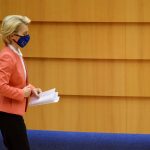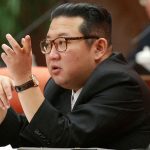The latest sanctions on Russia imposed by the United States and the United Kingdom represent a significant scaling-up and have clearly been devised in close collaboration.
Much will doubtless be made of the decision to sanction Vladimir Putin’s two adult daughters and the wife and daughter of his foreign minister Sergei Lavrov, but probably the most significant move has been the extra measures applied to Sberbank, Russia’s largest lender.
While the UK has imposed an asset freeze on Sberbank and on Credit Bank of Moscow, another Russian bank, the US has introduced what are known as ‘full blocking sanctions’ against both Sberbank and Alfa Bank (Russia’s biggest private bank) which go even further.
These institutions will now no longer be able to transact with any American individual or institution in any country and in any currency. It is sanctioning of a magnitude approaching some of the treatment Washington has handed out to Iran’s banks in the past.
These moves have proved very effective in hurting Iran’s economy and the Biden administration will clearly be hoping for a similar outcome here. Russia is already heading for a recession far sharper than anything it experienced during the pandemic and this will intensify its difficulties.
Strikingly, the US and the UK have introduced identical bans on any new inward investment into Russia, another move that will harm Moscow on an ongoing basis.
Government to nationalise key part of electricity grid to help meet climate goals
Air travel recovery ‘gathering steam’ but oil prices and airport chaos could hold it back
Easter travel chaos looms as air woes combine with rail maintenance and fallout from P&O Ferries scandal
The UK invested more than £11bn in Russia in 2020 alone while the US invested $14.4bn (£11bn) in Russia in 2019 and a further $12.5bn (£9.5bn) the following year.
These are big sums that will again deprive the Putin regime of growth opportunities. Crucially, it will also deprive Moscow of intellectual property and know-how that could spur productivity improvements in the country.
Not for nothing did one White House official remark this afternoon: “The reality is that [Russia] is descending into economic and financial and technological isolation. And at this rate it will go back to Soviet-style living standards from the 1980s.”
Also significant are the bans on Russian fuel exports. The US has already announced a complete ban on imports of Russian oil and gas, while the EU announced yesterday that it was banning the import of Russian coal but has so far hesitated to impose bans on Russian oil – which it imports to the tune of 2.3million barrels per day – or Russian gas.
The UK, after its latest salvo, now sits somewhere in between. No Russian coal – the low price of which contributed to the early closure of Britain’s remaining deep coal mines in the last few years – or Russian oil will be entering the UK by the end of 2022 while an end to imports of Russian gas “as soon as possible thereafter” is also promised.
Please use Chrome browser for a more accessible video player
It is worth pointing out, in fairness to the EU, that it is easier for the UK and US to impose such sanctions due to their comparatively low dependence on Russian energy sources.
For the EU and its most important economy, Germany, imposing similar penalties would be painful indeed.
Christian Lindner, the federal minister of finance in Germany, has gone so far as to say that a ban on Russian gas would hurt Germany more than it would hurt Russia itself.
The latest set of oligarchs targeted with asset freezes and travel bans is also not without meaning although, again, the UK appears in some cases to be catching up with sanctions on individuals already targeted by the US, or EU, or both.
For example, Sergey Ivanov, president of the world’s largest rough diamond producer Alrosa and whose father was a former comrade of Mr Putin’s in the KGB, has already been targeted by the US. Similarly, Andrey Guryev, the founder and chairman of fertiliser giant PhosAgro, was sanctioned by the EU almost a month ago.
But there is no doubt that sanctioning these individuals will hurt Mr Putin himself, as many of them are believed to hold assets on his behalf. That explains why, also, his daughters have been targeted.
Follow the Daily podcast on Apple Podcasts, Google Podcasts, Spotify, Spreaker
In the round, then, these are big penalties on Russia.
There is, though, a growing sense that the US, UK and EU have all gone as far as they can without hurting their own economies – although some corporates, such as BP, have already had to take very financially-painful decisions. The ‘easy to do’ sanctions have now been imposed.
Yet there is more, much more, that could be done. The EU’s foreign policy chief, Josep Borrell, revealed today that, since the war began, the EU has paid Russia €35bn (£29bn) for oil and gas.
At some point, if Putin’s war on Ukraine really is to be brought to a halt, an EU ban on Russian oil and gas is going to be essential.
And even that may not be enough to deprive the Putin regime of financial oxygen.
China buys even more fuel from Russia than the EU does – and it shows no sign of joining the West in punishing Mr Putin for his brutality.






















